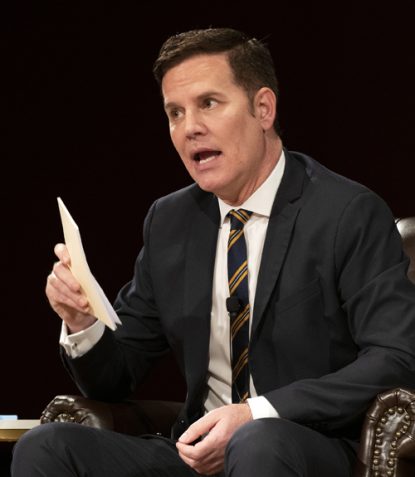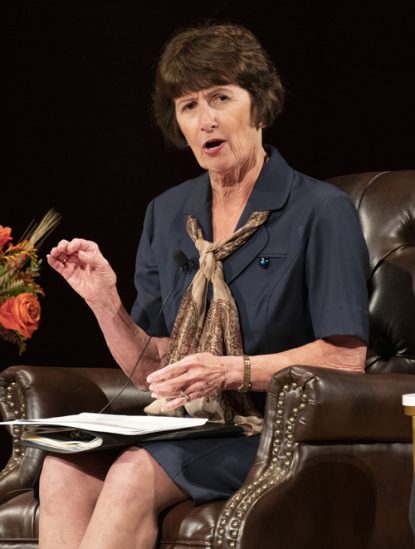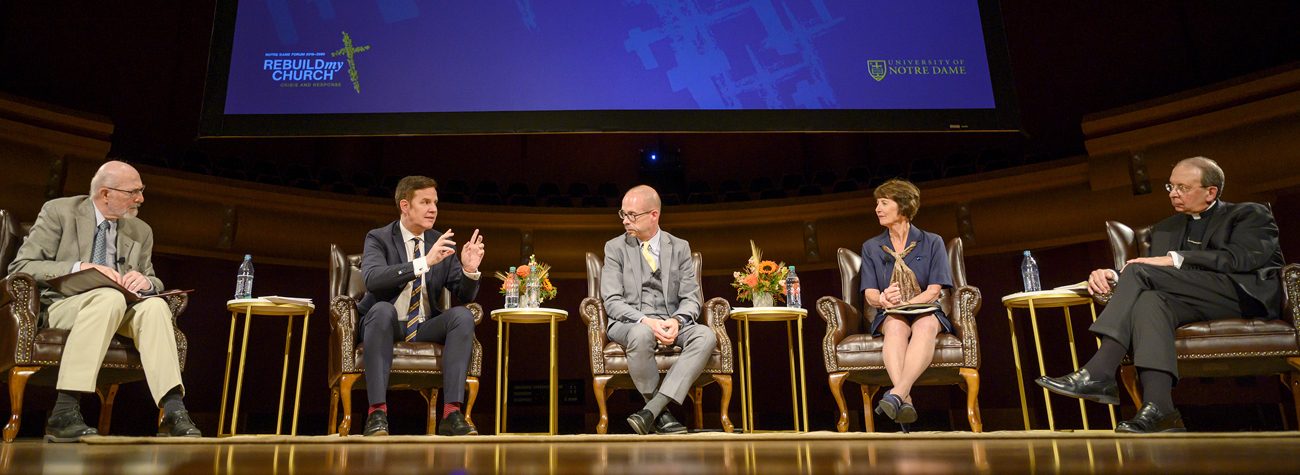NOTRE DAME, Ind. (CNS) — The annual University of Notre Dame forum on topics of importance began its 2019-20 season with the difficult issue of clergy sex abuse in a Sept. 25 keynote panel titled “The Church Crisis: Where Are We Now?”
The four panelists — Baltimore Archbishop William E. Lori, law enforcement consultant Kathleen McChesney, abuse survivor Juan Carlos Cruz and journalist Peter Steinfels — brought a wide spectrum of experience with the topic. Journalist John Allen, longtime Vatican correspondent for the National Catholic Reporter and now editor of Crux, moderated the discussion.
Steinfels, a journalist and educator, has reported on the sex abuse crisis for 30 years. A former columnist for The New York Times who continues a long career writing for Commonweal, he also has taught at Notre Dame, Georgetown and Fordham.
[hotblock]
He led off the panel by discussing the precipitous drop in the number of clergy sex abuse cases, declining by almost 97 percent over the past 60 years. Such statistics should not blind the church to the “excruciating” devastation caused by a single case of abuse, he continued, but the statistics cannot be ignored.
The sex abuse scandal will always remain one in the long list of betrayals of Jesus Christ over the centuries, Steinfels said.
He suggested five reasons for the crisis:
— The abuse scandal has gone global, which constitutes one big story about Catholicism even though just a fraction of the abuse has touched the church.
— The McCarrick case brought to a boil the long-simmering distrust of American hierarchy.
— The scandal has become part of a “Catholic civil war” over the papacy of Pope Francis.
— A growing number of state and federal investigations promises to produce a “drip, drip” of sensational headlines, draining resources and magnifying the ongoing hemorrhaging of the young from the faith.
— There is a “legacy of profound suffering, pain and desire for acknowledgement, contrition, justice and vindication” by abuse survivors primarily from 30 to 60 years ago, a legacy Steinfels compared to “landmines left buried in the ground after a war.”
He said the church needs an accurate history of the sex abuse scandal, based on archives, oral histories and studies, and he asked Catholic colleges and universities to take on the task.

Juan Carlos Cruz, an abuse survivor from Chile and a survivors’ advocate, gestures as he answers a question during a panel discussion titled “The Church Crisis: Where Are We Now?” at the University of Notre Dame in Indiana Sept. 25, 2019. (CNS photo/Barbara Johnston, University of Notre Dame)
Cruz, a clergy sex abuse survivor from Chile and outspoken advocate for survivors, told the audience that he speaks from the heart. He traveled to Rome and successfully convinced a skeptical Pope Francis that complaints about Chilean priest abusers were credible and should not be dismissed.
Cruz acknowledged that it is difficult to speak out, but said he was honored to have such a platform to encourage other survivors to seek help.
While things have improved in the U.S., he said, they have gotten worse in other parts of the world, including both Chile and Peru. He said he thought the abuse would end with Pope Francis’ 2019 “motu proprio” that addresses bishops’ accountability on handling abuse cases.
Cruz charged that some bishops bow to the pope when they are in Rome, but when they go back home, it is business as usual and nobody holds them accountable.
Archbishop Lori was appointed to the U.S. bishops’ Ad Hoc Committee on Sexual Abuse in 2002 and helped write the “Charter for the Protection of Children and Young People.” In 2019, the Archdiocese of Baltimore was the first in the nation to implement a policy to hold bishops accountable for allegations against them of abuse or negligence in handling reports of abuse.
[hotblock2]
The archbishop observed there are many learning curves for a bishop, but “I don’t think any of the learning curves have been as steep as discovering, learning, struggling to deal in some adequate way with the ugly specter of child abuse.”
He said various policies had been in place — in some dioceses — since the 1980s, and the 2002 charter was an attempt to have all bishops deal with victims compassionately and try to prevent future abuse.
“But it’s one thing to have policies and procedures in place and another thing to draw out from them … the moral imperative to address this in the way that God only knows it deserves to be addressed.”
Archbishop Lori said the numbers of abuse cases are significantly down, “but one case is still too many.” He emphasized that it is necessary always to see the charter and norms not just as policies to be complied with. Bishops and their co-workers, he said, also need to have “a conversion of mind and heart.”
The protection of children and care for survivors has to be as much a part of the church’s life as evangelization, Catholic education and raising up vocations, the archbishop said.

Kathleen McChesney, former FBI executive assistant director who investigated abuse victim allegations, speaks during a panel discussion titled “The Church Crisis: Where Are We Now?” at the University of Notre Dame in Indiana Sept. 25, 2019. (CNS photo/Barbara Johnston, University of Notre Dame)
McChesney had a long career in law enforcement, capped by service as FBI executive assistant director. She was appointed in 2002 as the first executive director of the U.S. bishops’ Office of Child and Youth Protection. She continues to consult on the topic.
She offered several observations, disappointments and predictions, based on her nearly two decades consulting on clergy sex abuse. First, she said it is “critical” for helping survivors heal to hold someone accountable for their abuse; yet she emphasized that not all Catholic abusers have been priests; lay church workers and volunteers also have been guilty.
She related that she has observed a serious lack of oversight of priests, because bishops do not have the time to see each priest every day and many priests are isolated. Laity can play a role in observing priests and helping them have healthy social relationships, she said.
Regarding seminaries, McChesney said the church has been emphasizing seminary formation, but she believes selecting “healthy men” for the priesthood is far more important than formation.
Among her disappointments were some failures to act on many of the recommendations of lay review boards and survivors, and a lack of research into the causes of abuse since the charter and why oversight failed.
McChesney predicted cases will continue against living bishops who are thought to be negligent in the way they handled abuse claims and that additional scandals will happen, either financial or sexual, whether in schools, other ministries or seminaries.
“The church will continue to be slow to reform,” she added. “I think that shouldn’t be an option, but I think that sadly, that is the way this church works.”
***
Carey writes for Today’s Catholic, newspaper of the Diocese of Fort Wayne and South Bend.
PREVIOUS: After faith leaders’ border visit, the resolve to help migrants grows
NEXT: Looking at Elizabeth Warren’s child care plan through a pro-life lens




Share this story